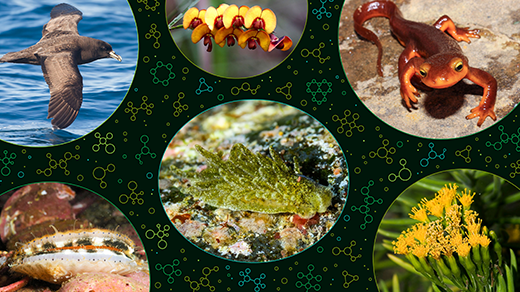What's up in
Chemistry
Latest Articles
A New, Chemical View of Ecosystems
Rare and powerful compounds, known as keystone molecules, can build a web of invisible interactions among species.
The Cosmos Teems with Complex Organic Molecules
Wherever astronomers look, they see life’s raw materials.
The Enduring Mystery of How Water Freezes
Making ice requires more than subzero temperatures. The unpredictable process takes microscopic scaffolding, random jiggling and often a little bit of bacteria.
Nobel Prize Honors Inventors of ‘Quantum Dot’ Nanoparticles
The Nobel Prize in Chemistry has been awarded to three researchers who harnessed the quantum behaviors of semiconductor nanocrystals.
How the Brain Protects Itself From Blood-Borne Threats
To buffer the brain against menaces in the blood, a dynamic, multi-tiered system of protection is built into the brain’s blood vessels.
How a Human Smell Receptor Works Is Finally Revealed
After decades of frustration, researchers have determined how an airborne scent molecule links to a human smell receptor.
Inside Ancient Asteroids, Gamma Rays Made Building Blocks of Life
A new radiation-based mechanism adds to the ways that amino acids could have been made in space and brought to the young Earth.
‘Fullertubes’ Join the Family of Carbon Crystals
The buckminsterfullerene revolution never came, but some researchers are eagerly exploring the properties of newfound carbon crystals known as fullertubes.
Machine Learning Highlights a Hidden Order in Scents
Efforts to build a better digital “nose” suggest that our perception of scents reflects both the structure of aromatic molecules and the metabolic processes that make them.








